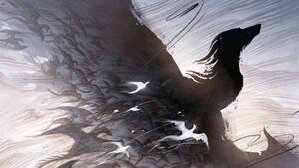The New Fears anthology series is eclectic by design. Volume two, now available from Titan Books, makes good on editor Mark Morris’s ambition to “bring back the un-themed horror anthology—and not as a one-off, but as an annual publication, with each volume acting as a showcase for the very best and most innovative fiction that this exhilarating genre has to offer.” With twenty-one new stories to choose from, we asked our editors to recommend a few of their favorites to get your scary-season reading off to a thrilling start.
Mark Springer: Nightmares Are the Price We Pay for Dreaming
Fear knows no boundaries, and neither does this collection. The absence of an overarching theme is liberating. Having nothing to guide me but the broadest expectations of what “horror” can encompass (which is anything, really), I found myself approaching each story with a heightened sense of anticipation. I never knew what I would encounter on the next page, but my imagination was primed to follow wherever an author wanted to lead me.
In “Maw,” the opening story by Priya Sharma, the destination is Little Isle, where a mysterious shipping container washes ashore after a storm. It’s the first bounty the islanders have received from the sea in a long time, but don’t be fooled into thinking that it comes without a cost. Maw, the maelstrom churning in the waters off the island’s coast, holds sway over the currents, and the island’s history, too. According to local lore, Maw must be fed. The old tradition is to send offerings to Maw at harvest, “wicker and wooden boats, laden with gifts” to appease the hungry spirits of the sea. This legacy of sacrifice is mostly forgotten now, the practice lost along with the island’s sea-faring way of life. Magnus Spence, grandson of a legendary fisherman who somehow managed to briefly revive the foundering fishing industry two generations earlier, is one of the few islanders to still send boats to Maw. Magnus views the mysterious shipping container as an opportunity—salvage to be claimed and sold for the benefit of the community. Simon, the posh son of privilege who inherited the island from his father, has no such illusions; he plans to call the British coastguard as soon as communication with the big isle is restored.
The friction between Magnus and Simon is about more than a disagreement over the shipping container, of course. The two men stand on opposite sides of social, cultural, and economic fault lines that have divided people for centuries, if not millennia. What’s most unbearable to Magnus is not Simon’s unearned wealth, but the man’s insistence that change is inevitable. Don’t underestimate the power of nostalgia or the pull of the maelstrom, however. The future is never free of the past, for good or for ill. We always face a reckoning for our desires sooner or later, and often the cost is blood.
Sharma’s excellent opener is followed by Stephen Volk’s “The Airport Gorilla,” which offers a different take on the cost of desire. What begins as a lighthearted, even funny tale narrated by a stuffed gorilla purchased at an airport gift shop soon takes a dark turn. The gorilla isn’t your average sentient supernatural toy. No, this gorilla grants wishes—three wishes, to be exact—and it spoils nothing to say that readers familiar with W. W. Jacobs’s story “The Monkey’s Paw” will thrill at Volk’s inversion of the horror classic.
In traditional wish-granting stories, a person’s wish must be uttered with conscious intent before it is granted—and before its unintended consequences are felt. Indeed, it is the explicit pairing of desire with consequence that provides gravitas to the cautionary moral we’ve come to expect: “Be careful what you wish for, you just might get it.”
Not so in “The Airport Gorilla.” The unfortunate “hosts” whose lives are changed by the wish-granting spirit are unsuspecting of their peril. The gorilla can’t communicate with them; there is no grizzled veteran back from uncivilized lands to explain the rules. The wishes don’t even have to be spoken aloud, or wished with conscious intent. The gorilla simply eavesdrops on the host’s thoughts, and when a host desires for the world be other than it is, the wish is granted.
The results are grim, to be sure, but what makes this reimagining of the trope truly horrifying are its philosophical implications. With no feedback loop between a wish and its consequences, there is no opportunity for revelation, no lesson to be learned. With no conscious intent required to commit the wish, there is no chance for a host to exercise self-control, no threshold of desire at which she can turn back before it’s too late. It’s fatalism without the classical idea of Fate, as my colleague Theodore McCombs put it recently. The horror isn’t that we’re completely helpless; it’s that our desires and dreams do have the power to change the world, just not in the ways we expect, and rarely for the better. I wish it were different, but nightmares are the price we pay for dreaming.
Gemma Webster: Horror Is a Body Genre
Embarking on this anthology reminded me so much of the giddiness I felt as a kid when my fall scholastic book order contained the newest volume of Scary Stories to Tell in the Dark. My best friend and I would read them to each other on the school bus and as we walked across the meadow to her house. Megan Pillow Davis, in her essay for Electric Lit, tells us that horror (like porn and melodrama) is a body genre. Our bodies react when we read it, when we watch. The middle of New Fears 2 is truly the body of the book, and these stories will burrow into yours as they did mine.
In “Steel Bodies” by Ray Cluley, we’re transported to the Chittagong Ship Breaking Yard in Bangladesh, where workers die gruesome deaths scavenging and recycling the bodies of defunct container ships and cruise ships. Not only has this work broken the workers’ bodies but it has claimed their spirits as well. Samir is there to release their ghosts, if he can. The subtext: Western demand for cheap goods and pleasure has created an economic engine that runs on the literal blood of the poor. This is a body-exploitation story that would pair well with Night of the Living Dead (the original, of course).
“Rut Season” by Brian Hodge rang so many bells for me that at several points in the story I didn’t want to see where it went. It felt like home; the rural setting with it’s recurring roadside mounds of deer carcass, the decaying too-large house, the stubborn aging parents, the way a heart can harden in the face of impending loss. While my family isn’t really in this place, yet, I could see how easily we could go there. I have definitely acquired a new fear here, and quite possibly a useful one.
I don’t know when or where I picked up the fear of turning into my mother. If I had to guess, I’d suspect it is some combination of the childish resentment of being disciplined and our pervasive patriarchal culture’s loathing of women who know what is what. “Sentinel” by Catriona Ward invites us to get over that fear because there are actual horrors that mothers guard their children against. Providing this protection comes at a price; it can take everything from a mother, even rendering her fearsome to her children.
We feel these fears in our bones, in our guts, in our hearts. In this state of vulnerability we are given the gift of knowing that we are not alone when we suffer. My friend and I didn’t know this as little girls walking through the snow, but we were cultivating this connection nonetheless. I truly believe that engaging with stories about the suffering of others can help make you brave in the face of the awful realities we too often face in this world—and brave enough to overcome them.
Theodore McCombs: Monsters of Despair
At WorldCon this August, I sat in on a panel of notable anthology editors—Ellen Datlow, Lynne Thomas, Jonathan Strahan, and John Joseph Adams, whose anthologies, like New Fears, each manage to show a distinct editorial vision, even across diverse work and authors. One audience member asked how the editors order stories within an anthology, and they talked particularly about the last handful of stories as a kind of finale. The second-to-last story can be the bravura, showstopper piece, with the last story a grace note; or the final stories can build to a statement, a summation for the anthology.
In New Fears 2, the last three stories’ monsters surface from an ugly mix of abuse and economic despair. In Paul Tremblay’s “The Dead Thing,” a neglected teen girl desperately tries to protect her little brother from their drug-addled parents’ squalor, which manifests as a green, cardboard shoebox with something bad in it—something very bad—“it feels blob-like, oozy … the bottom of the box, the underside, feels damp, and then, oh my god, the smell.” In Alison Moore’s “The Sketch,” a young mother, bullied by the men in her life, finds in her old portfolio a pencil drawing of a troll she doesn’t remember making; the same creature seems to haunt their grubby, cramped flat as the extent of her abjection grows clearer. And last, Bracken MacLeod’s “Pigs Don’t Squeal in Tigertown” is a noir shootout at a run-down roadside tiger zoo, where the abused animals get the last word in the sordid struggle between owner, biker-gang enforcer, and the sheriff’s office.
Each of these stories goes from bad to worse: the protagonists are trapped in cycles of poverty, neglect, and hopelessness, and that hopelessness takes on a hideous life and agency to make things even grimmer. Bleak, maybe, but that is a new fear, or at least one that’s particularly true to our times. We’re afraid that things won’t get better—that, faced with challenge, humans won’t band together and show our pluck; that “economic anxieties” will fuel further injustice, divisions, and violence; that the traps only close tighter. Horror is in a unique position to navigate this fear and understand it; and Moore and Tremblay’s stories are particularly exciting for it. Moore’s soft, oblique dread gives “The Sketch” a satisfying punch, while Tremblay’s neurotic, formally daring prose makes his narrator feel as young, flawed, and heroic as she should be. Their prospects may be grim, but their stories left me energized.
































Cadwell Turnbull's new novel — the first in a trilogy — imagines the hard, uncertain work of a fantastical justice.